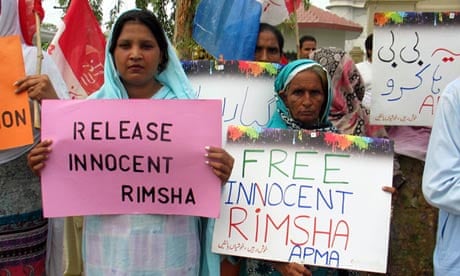Islamic leaders in Pakistan on Monday came out in support of a Christian girl with learning difficulties who is being held in prison, in an unprecedented public denunciation of the blasphemy law by hard-line mullahs.
The All Pakistan Ulema Council, an umbrella group of Muslim clerics and scholars, which includes representatives from fundamentalist groups, joined hands with the Pakistan Interfaith League, which includes Christians, Sikhs and other religions, to call for justice for the girl, Rimsha, who is accused of blasphemy. They also demanded that those making false allegations be punished.
Tahir Ashrafi, the chairman of the council, warned that the "law of the jungle" was gripping Pakistan, with police routinely pressured by baying mobs to register blasphemy charges, as happened in the case of Rimsha, which has made headlines around the world.
Rimsha, 11, was charged earlier this month with desecrating the Qur'an. The issue has shocked the country's Christian population. Rimsha's own community, who were living in a mixed poor Christian-Muslim enclave in Islamabad, were driven out of their homes by a rampaging crowd.
Rimsha's fate should become clearer on Tuesday when, following a medical examination, a report is due to be presented in court on her mental condition and her age. She is being held in a maximum security jail, where her lawyer says she is deeply traumatised and begging to be released. Her parents have also been taken into protective custody. "We see the Rimsha as a test case for Pakistan's Muslims, Pakistan's minorities and for the government," Ashrafi said. "We don't want to see injustice done with anyone. We will work to end this climate of fear."
Ashrafi is also part of the leadership of the radical Defence of Pakistan Council, a coalition of Islamic organisations which includes some thinly disguised banned militant groups. The outfit campaigns against western influence and to stop Nato supplies passing through the country to Afghanistan.
Among the other unlikely Islamist groups rallying round Rimsha is Khatm-e-Nubuwwat, which has been accused of being behind violence against another minority, the Ahmedis, an offshoot of Islam.
"This is the first time in the history of Pakistan that the Muslim community and scholars have stood up for non-Muslims," said Sajid Ishaq, chairman of the Pakistan Interfaith League. "We are together, demanding justice, demanding an unbiased investigation. And those abusing this law should be taken care of."
It is dangerous in Pakistan even to discuss blasphemy, which carries the death penalty. The law is frequently used to level false allegations in order to settle scores, with lurid tales of burning or desecrating the Qur'an levelled against religious minorities and fellow Muslims. The police and the courts are usually too afraid to investigate the validity of the claims, leading to convictions on hearsay.
In January last year, a leading politician from the ruling Pakistan Peoples party, Salman Taseer, was gunned down by one of his bodyguards after he described the statute on blasphemy as a "black law" and called for the release of a Christian woman, Asia Bibi, convicted under it. Taseer's murder was condoned and even celebrated by many in Pakistan – the judge who eventually convicted his self-confessed murderer had to flee the country. Asia Bibi remains behind bars, despite the flimsiest of evidence against her.
Pakistan's minister for minorities, Shahbaz Bhatti, was also assassinated last year after he questioned the law. In 2009, after rumours of the desecration of the Qur'an, an angry mob attacked the Christians in the town of Gojra, burning at least eight alive.
All of Rimsha's community, about 300 Christian families, are now living away from their homes, either with relatives or in makeshift shelters elsewhere in Islamabad. "We'll never go back. We have young children. How can we go back? They won't even let us say our prayers there," said Zahid Pervez, whose house has been looted of its few valuable possessions. "We will sit on the roads, for however long it takes, until we are given somewhere else to live."
Another now-destitute Christian, Shaukat Masih, added: "The fear of Gojra is in our hearts."
